新人教版2019初一下册英语知识点
人教版初中英语七年级下册知识点总结
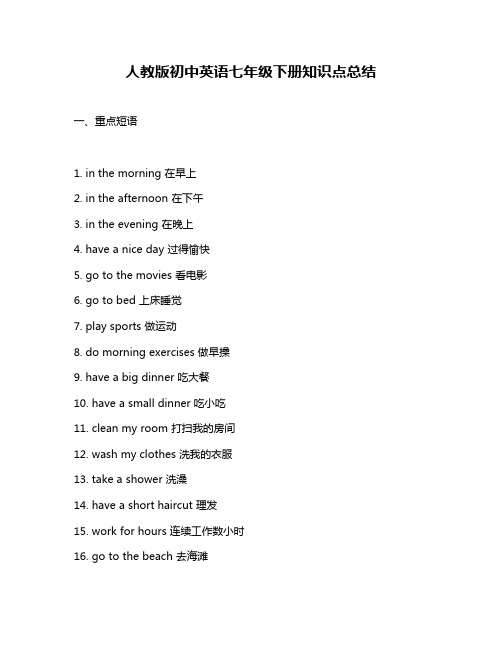
人教版初中英语七年级下册知识点总结一、重点短语1. in the morning 在早上2. in the afternoon 在下午3. in the evening 在晚上4. have a nice day 过得愉快5. go to the movies 看电影6. go to bed 上床睡觉7. play sports 做运动8. do morning exercises 做早操9. have a big dinner 吃大餐10. have a small dinner 吃小吃11. clean my room 打扫我的房间12. wash my clothes 洗我的衣服13. take a shower 洗澡14. have a short haircut 理发15. work for hours 连续工作数小时16. go to the beach 去海滩17. on the weekend 在周末18. listen to music 听音乐19. have a party 举办聚会20. watch TV 看电视21. play computer games 玩电脑游戏22. in the pool 在游泳池里23. go to the zoo 去动物园24. in the mountains 在山里25. have fun 玩得开心26. the great wall 长城27. many places of interest 名胜古迹28. be ready for 为……准备好29. stay healthy 保持健康30. how much 多少31. would you like 一些……吗?32. some noodles 一些面条33. order a pizza 定一个披萨饼34. make a phone order 电话订购35. would you like to do sth 你愿意做某事吗?36. want to do sth 想做某事37. would you like +名词你愿意要……吗?38. would you like +动词不定式你愿意……吗?39. choose some food 选择一些食物40. order the food 订购食物41. be careful 当心;小心42. not much 不多;少量的43. be ready to do sth 准备好做某事。
(完整版)新人教版英语七年级下册1-12单元知识点归纳

Unit 1 Can you play the guitar?语言点梳理一、语法:情态动词:有一定意义,表示说话人的语气或情态,但不能单独作谓语,只能和其他动词原形一起构成谓语,没有人称和数的变化。
否定形式是在情态动词后面加上not。
变一般疑问句要把情态动词提到句子的开头,即:情态动词+主语+动词原形+其他?1.肯定句:He/She/I/We/They/You/Tom+情态动词can+动词原形.2.否定句:He/She/I/We/They/You/Tom+情态动词can+not+动词原形3.一般疑问句:情态动词can+ He/She/I/We/They/You/Tom+动词原形?Yes,主语+can./No,主语+ can’t.1)表示能力,“会;能”。
eg: Can you dance? 你会跳舞吗?2)表示请求或许可,“可以”。
eg: Can I ask you a question? 我可以问你一个问题吗?1. play the guitar/piano/violin/drums弹吉他/钢琴/小提琴/敲鼓play chess下象棋play sports 做运动play soccer/basketball踢足球、打篮球(乐器名称前加the,球类名称前不加the)2. join the art club加入艺术俱乐部/swimming club游泳俱乐部sports club运动俱乐部/story telling club讲故事俱乐部English club/ art club/ music clubjoin v.参加,加入指加入某个团体,组织,群体,并成为其中的一员。
What club do you want to join ?你想加入什么俱乐部?I want to join the swimming club.=I want to be in the swimming club.takeEg. take part in the meeting参加会议3. want sth.想要某物want to do sth.想做某事want sb to do sth 想要某人做某事4. be good at(doing...)擅长于=do well in 在某方面做得好be good with与…相处的好be good for对…有益5. like to do sth.喜欢做某事like doing sth.6. Let’s do sth.让我干…let/make sb.do sth.使某人做某事10. write stories写故事write to sb= write a letter to sb= write sb a letter11.tell /speak/say/talk的用法1) tell讲述一件事实或故事等及物动词tell sb. sth 给某人讲某事=tell sth to sb 把某事告诉某人tell sb. to do sth 告诉某人做某事tell stories讲故事=tell a story tell a lie撒谎2)speak v. 主要是讲说话的能力,往往接语言speak English讲英语3)talk 为不及物动词往往加介词再接宾语talk to sb.和…交谈/talk with sb.和…交谈(指双方)4)say往往接说话的内容eg.Our teacher says we should study hard.say it in English用英语说它12. make friends with sb.和…交朋友13. play games with sb.和…做游戏14. help sb. with sth.= help sb. (to) do sth.帮助某人做某事15. call sb. at +电话号码给某人打电话拨+号码16. on /at the weekend 在周末on weekends after school放学后17.do Chinese kung fu 打中国功夫18.be free 空闲的19. sing very well 唱得好That sounds good. 那听起来很好20.English-speaking students 讲英语的学生学生运动中心23.also /too/eitheralso/too用在肯定句,also 用于句中,too 用于句尾,either用于否定句句未eg. I am a student . He is a student,too. I am a student . He is also a student.I am not a student . He is not a student, either.24.and/or 连接两个并列成分eg.I can sing and dance.(and用于肯定句)I can’t sing or dance.(or用于否定句)Can you sing or dance ?(or用于选择疑问句“或者”)25.at27. need to do sth需要干某事need sb. to do sth 需要某人干某事28.wanted students for School show学校表演招聘学生v.展示;给….看… show sb. Sth= show Sth to sb.给某人展示n.节目;表演TV show电视节目29.teach v.教,讲授teacher n.教师teach sb.English教某人英语teach sb. sth .= teach sth to sb.教给某人某事=教某事给某人teach sb.to do sth教给某人做某事30.music n.音乐musician n. 音乐家31.piano (pl.) pianosUnit 2 What time do you go to school?知识点梳理1.What time do you get up?What time +助动词do/does +主语+动词原形,询问某人做某事的具体时间。
2019年人教版七年级英语下册重点知识点汇总
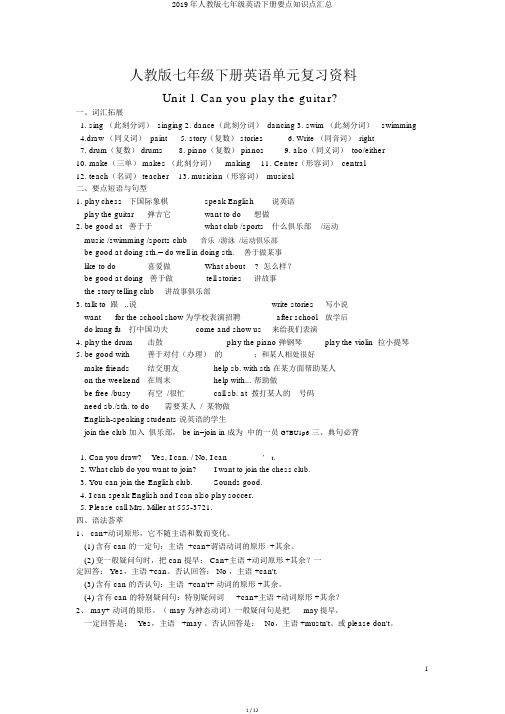
人教版七年级下册英语单元复习资料Unit 1Can you play the guitar?一、词汇拓展1. sing (此刻分词) singing2. dance(此刻分词) dancing3. swim (此刻分词)swimming4.draw (同义词) paint5. story(复数) stories6. Write (同音词) right7. drum(复数) drums8. piano(复数) pianos9. also(同义词) too/either10. make(三单) makes (此刻分词)making 11. Center(形容词) central12. teach(名词) teacher 13. musician(形容词) musical二、要点短语与句型1. play chess下国际象棋speak English说英语play the guitar弹吉它want to do想做2. be good at善于于what club /sports什么俱乐部/运动music /swimming /sports club音乐/游泳/运动俱乐部be good at doing sth.= do well in doing sth.善于做某事like to do喜爱做What about ?怎么样?be good at doing 善于做tell stories讲故事the story telling club讲故事俱乐部3. talk to 跟 ..说write stories写小说want for the school show 为学校表演招聘after school放学后do kung fu打中国功夫come and show us来给我们表演4. play the drum击鼓play the piano 弹钢琴play the violin 拉小提琴5. be good with善于对付(办理)的;和某人相处很好make friends结交朋友help sb. with sth 在某方面帮助某人on the weekend在周末help with... 帮助做be free /busy有空/很忙call sb. at拨打某人的号码need sb./sth. to do需要某人/某物做English-speaking students 说英语的学生join the club 加入俱乐部, be in=join in 成为中的一员G7BU1p6三、典句必背1. Can you draw? Yes, I can. / No, I can’ t.2. What club do you want to join?I want to join the chess club.3. You can join the English club.Sounds good.4.I can speak English and I can also play soccer.5.Please call Mrs. Miller at 555-3721.四、语法荟萃1、 can+动词原形,它不随主语和数而变化。
2019年人教版七年级下册英语各单元知识点大归纳

人教版七年级下册英语各单元知识点大归纳Unit 1 Can you play the guitar?◆短语归纳1. play chess 下国际象棋2. play the guitar 弹吉他3. speak English 说英语4. English club 英语俱乐部5. talk to 跟…说6. play the violin 拉小提琴7. play the piano 弹钢琴 8. play the drums 敲鼓9. make friends 结交朋友10. do kung fu 练(中国) 功夫11. tell stories 讲故事12. play games 做游戏13. on the weekend/on weekends 在周末◆用法集萃1. play +棋类/球类下……棋,打……球2. play the +西洋乐器弹/拉……乐器3. be good at doing sth.= do well in doing sth. 擅长做某事4. be good with sb. 和某人相处地好5. need sb. to do sth. 需要某人做某事6. can + 动词原形能/会做某事7. a little + 不可数名词一点儿……8. join the …club 加入…俱乐部9. like to do sth. =love to do sth. 喜欢/喜爱做某事◆典句必背1. Can you draw? Yes, I can. / No, I can’t.2. What club do you want to join? I want to join the chess club.3. You can join the English club.4. Sounds good./That sounds good.5. I can speak English and I can also play soccer.6. Please call Mrs. Miller at 555-3721.◆话题写作Dear Sir,I want to join your organization (组织) to help kids with sports, music and English. My name is Mike. I am 15 years old. I’m a student in No. 1 Middle school. I can play the guitar well. I can sing many songs. I can swim and speak English well, too. I think I can be good with the kids. I also do well in telling stories.I hope to get your letter soon.Yours,MikeUnit 2 What time do you go to school?◆短语归纳1. what time 几点2. go to school 去上学3. get up 起床4. take a shower 洗淋浴5. brush teeth 刷牙6. get to 到达7. do homework 做家庭作业8. go to work 去上班9. go home 回家10. eat breakfast 吃早饭11. get dressed 穿上衣服12. get home 到家13. either…or… 要么…要么…14. go to bed 上床睡觉◆典句必背1. What time do you usually get up? I usually get up at six thirty.2. That’s a funny time for breakfast.3. When do students usually eat dinner? They usually eat dinner at a quarter to seven in the evening.4. In the evening, I either watch TV or play computer games.5. At twelve, she eats lots of fruit and vegetables for lunch..6. She knows it’s not good for her, but it tastes good.7. Here are your clothes.◆话题写作主题:谈论日常作息习惯My School DayI am a student. I usually get up at seven, and I eat breakfast at seven thirty. Then I go to school at eight. School starts at eight thirty. I eat lunch at twelve. I go home at 17:00. I often eat dinner at 19:00 and then play the piano. I do my homework at 20:00. At 22:00, I go to bed.Unit 3 How do you get to school?◆短语归纳1. get to school 到达学校2. take the subway 乘地铁3. ride a bike 骑自行车4. how far 多远5. from home to school 从家到学校6. every day 每天7. take the bus 乘公共汽车8. by bike 骑自行车9. bus stop 公共汽车站10. think of 认为11. between … and … 在…和…之间12. one 11-year-old boy 一个11岁的男孩13. play with … 和…玩14. come true 实现15. have to 不得不◆用法集萃1. take… to …= go to … by… 乘…去…2. How do / does (sb)get to …? …是怎样到…的?3. How far is it from … to …? 从…到…有多远?4. It takes sb. some time to do sth. 做某事花费某人多长时间。
七年级下册人教版英语知识点
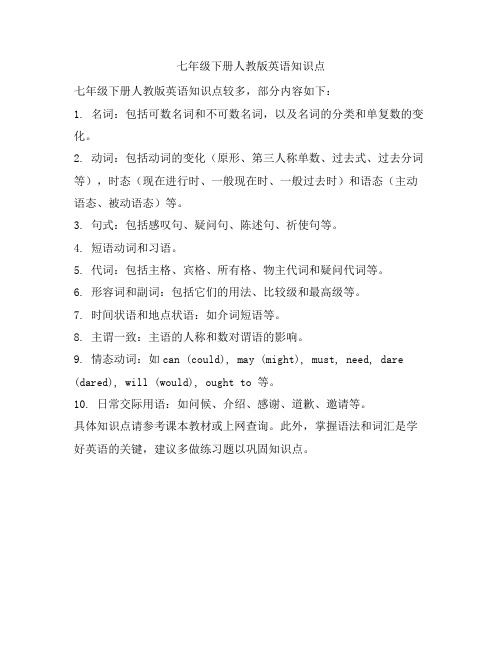
七年级下册人教版英语知识点
七年级下册人教版英语知识点较多,部分内容如下:
1. 名词:包括可数名词和不可数名词,以及名词的分类和单复数的变化。
2. 动词:包括动词的变化(原形、第三人称单数、过去式、过去分词等),时态(现在进行时、一般现在时、一般过去时)和语态(主动语态、被动语态)等。
3. 句式:包括感叹句、疑问句、陈述句、祈使句等。
4. 短语动词和习语。
5. 代词:包括主格、宾格、所有格、物主代词和疑问代词等。
6. 形容词和副词:包括它们的用法、比较级和最高级等。
7. 时间状语和地点状语:如介词短语等。
8. 主谓一致:主语的人称和数对谓语的影响。
9. 情态动词:如can (could), may (might), must, need, dare (dared), will (would), ought to 等。
10. 日常交际用语:如问候、介绍、感谢、道歉、邀请等。
具体知识点请参考课本教材或上网查询。
此外,掌握语法和词汇是学好英语的关键,建议多做练习题以巩固知识点。
人教版七年级英语下册知识点归纳整理
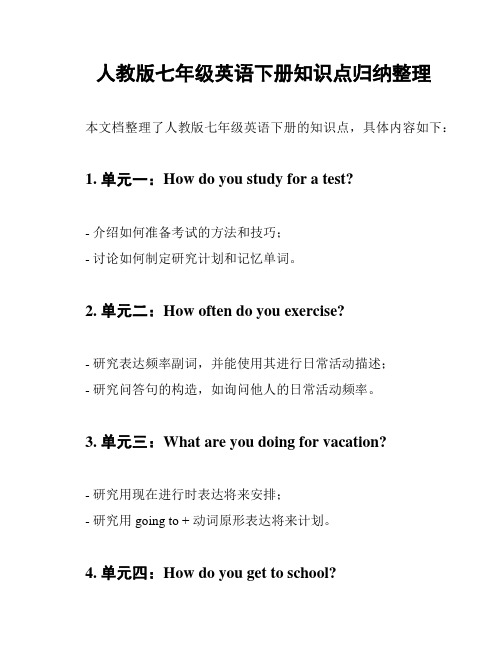
人教版七年级英语下册知识点归纳整理本文档整理了人教版七年级英语下册的知识点,具体内容如下:1. 单元一:How do you study for a test?- 介绍如何准备考试的方法和技巧;- 讨论如何制定研究计划和记忆单词。
2. 单元二:How often do you exercise?- 研究表达频率副词,并能使用其进行日常活动描述;- 研究问答句的构造,如询问他人的日常活动频率。
3. 单元三:What are you doing for vacation?- 研究用现在进行时表达将来安排;- 研究用going to + 动词原形表达将来计划。
4. 单元四:How do you get to school?- 研究表达交通方式;- 研究表示方位和位置的词汇。
- 研究表达允诺和请求,并能用英语进行邀请;- 研究表达能力和兴趣。
6. 单元六:I'm more outgoing than my sister.- 研究表达个人特点和比较两个人的不同之处;- 研究用比较级进行比较。
7. 单元七:What does he look like?- 研究描述人的外貌特征;- 研究宾语从句的用法。
8. 单元八:Do you have a soccer ball?- 研究表达物品的拥有与没有;- 研究描述物品数量和多少。
9. 单元九:How was your school trip?- 研究用过去式回顾过去经历;- 研究用过去进行时描述过去正在发生的事情。
10. 单元十:What's the longest river in the world?- 研究地理知识和世界之最;- 研究对事物进行提问并进行回答。
以上为人教版七年级英语下册的知识点归纳整理。
新人教版七年级下册英语各单元知识点总结

新人教版七年级下册英语各单元知识点总结Unit 1 Can you play the guitar?1,情态动词+V 原can do= be able to docan 的用法歌诀can 可用来表力量,但与实动不分别。
不管主语何变换, can 的模样永不变。
只要句中消灭 can,动词原形后面站。
一般疑问 can 提前,否认 can 后not 添。
2, Play+ the+ 乐器 play the violin/piano/drums (乐器前加 the)Play +球类,棋类play football play chess (球类和棋类前省略 the)3,join 参与社团、组织、团体take part in :参与运动、活动 join sb. 参加某人4, 4 个说的区分:say+内容:say it in English 用英语说它speak+语言: speak English 说英语talk 谈论 talk about sth. 谈论某事 talkwith/to sb 和某人交谈tell 告知,表达tell sb. (not)to do sth告知某人(不)去做某事(tell a story)tell stories/ jokes 讲故事/笑话5, want 的用法:想要(动词)(1) want to do sth.= would like to do sth 想要做某事(2) want (sb)to do sth.= would like +(sb)to do sth 想要做某事6, 4 个也的区分: too 确定句末(前面加逗号)either 否认句末(前面加逗号)also 句中,放在实意动词前, be 动词和情态动词之后as well 口语中(前面不加逗号)7, be good at =do well in+ V-ing/N. 擅长于(做)…… be good at playing soccer用法拓展:be good for 对…有益(be bad for 对…有害)be good to 对…友好(good 可用 friendly,nice,kind 替换)be good with 和…相处好=get on/ along well with8,特别疑问句的构成:疑问词+一般疑问句9, How/ what about+V-ing …怎么样?(表建议)What about playing basketball ? 10,感官动词(look, sound, taste, smell, feel)+adj/ like11.选择疑问句:答复不能直接用 Yes 或者 No,要从中选择一个答复Can you play the piano,,the drums,or the guitar? Ican play the drums.你会弹奏钢琴,敲鼓,或者弹吉他吗?我会打鼓12,students wanted for school show 学校演出招募学生(wanted 表示招募,含有被动意义)13,show sth to sb=show sb sth 给某人看某物 show me your book=show your book to me on show,意为“在展出”give sth to sb=give sb sth 给某人某物give me a pen =give a pen to me14,help sb (to)do sth 帮助某人做某事help sb with sth 帮助某人某事with sb’s help= with the help of sb 在某人的帮助下help oneself to 任凭享用15,be busy doing sth= be busy with sth 忙于做某事,be busy doing his homework= be busy with his homework 忙于他的家庭作业116,sb. need to do sth 某人需要做某事 need sb. to do sth 需要某人做某事17,be free= have time 有空的be busy 劳碌的18,make friends 交朋友 make friends with sb.与某人交朋友19,call sb at +电话号码给某人打---电话20,on the weekend= on weekends 在周末21,English-speaking students 说英语的学生(带有连词符,有形容词性质)22,do kung fu 表演功夫23,in, on 和at 在表达时间方面的区分①in+年、月、季节;泛指在上午,下午,晚上,如: inthe morning(afternoon, evening). in spring 在春季in September 在九月②on 指在某一天或某一天的上午,下午,晚上,具体到某一天、节日如: on Monday, on Sunday afternoon, on July 1, 1999 on New Year’s Day③at,一般表示点时间,如 at six o’clock, at three thirty.、习惯用法: at night, at noon,留意:在英语中,假设时间名词前用 this, last, next 等修饰时,像这样的表示,“在某时”的时间短语前,并不需要任何介词。
人民教育出版社 七年级英语(下册)全册重点知识点(2019年春)

2019年春人教版七年级英语下册重点知识XX市XX镇XX小学2019年2月28日目录Unit 1 Can you play the guitar? (8)Section A (8)【重点单词】 (8)【单词变形】 (9)【重点短语】 (9)【重点句型】 (10)Section B (11)【重点单词】 (11)【单词变形】 (12)【重点短语】 (12)【重点句型】 (13)Unit 2 What time do you go to school? (15)Section A (15)【重点单词】 (15)【单词变形】 (16)【重点短语】 (16)【重点句型】 (17)Section B (18)【重点单词】 (18)【重点短语】 (19)【重点句型】 (20)Unit 3 How do you get to school? (22)Section A (22)【重点单词】 (22)【单词变形】 (23)【重点短语】 (24)【重点句型】 (24)Section B (25)【重点单词】 (25)【单词变形】 (26)【重点短语】 (26)【重点句型】 (27)Unit 4 Don't eat in class. (28)Section A (28)【重点单词】 (28)【单词变形】 (29)【重点短语】 (29)【重点句型】 (30)Section B (31)【重点单词】 (31)【重点短语】 (32)【重点句型】 (33)Unit 5 Why do you like pandas? (34)Section A (34)【重点单词】 (34)【单词变形】 (35)【重点短语】 (35)【重点句型】 (36)Section B (37)【重点单词】 (37)【单词变形】 (38)【重点短语】 (38)【重点句型】 (39)Unit 6 I'm watching TV. (40)Section A (40)【重点单词】 (40)【单词变形】 (41)【重点短语】 (41)【重点句型】 (43)Section B (44)【重点单词】 (44)【重点短语】 (45)【重点句型】 (46)Unit 7 It's raining! (48)Section A (48)【重点单词】 (48)【单词变形】 (49)【重点短语】 (49)【重点句型】 (50)Section B (51)【重点单词】 (51)【单词变形】 (52)【重点短语】 (53)【重点句型】 (54)Unit 8 Is there a post office near here? (54)Section A (54)【重点单词】 (54)【单词变形】 (55)【重点短语】 (55)【重点句型】 (56)Section B (57)【重点单词】 (57)【重点短语】 (58)【重点句型】 (59)Unit 9 What does he look like? (60)Section A (60)【重点单词】 (60)【单词变形】 (61)【重点短语】 (61)【重点句型】 (62)Section B (63)【重点单词】 (63)【单词变形】 (64)【重点短语】 (64)【重点句型】 (65)Unit 10 I'd like some noodles. (66)Section A (66)【重点单词】 (66)【单词变形】 (66)【重点短语】 (67)【重点句型】 (67)Section B (68)【重点单词】 (68)【重点短语】 (70)【重点句型】 (71)Unit 11 How was your school trip? (72)Section A (72)【重点单词】 (72)【单词变形】 (73)【重点短语】 (74)【重点句型】 (75)Section B (76)【重点单词】 (76)【单词变形】 (77)【重点短语】 (77)【重点句型】 (78)Unit 12 What did you do last weekend? (79)Section A (79)【重点单词】 (79)【单词变形】 (80)【重点短语】 (81)【重点句型】 (81)Section B (83)【重点单词】 (83)【重点短语】 (84)【重点句型】 (86)Unit 1Can you play the guitar?Section A【重点单词】1.guitar n.吉他2.sing v.唱歌3.swim v.& n.游泳4.dance v.跳舞n.舞蹈5.draw v.画6.chess n.国际象棋7.speak v.说(某种语言);说话8.join v.参加;加入9.club n.俱乐部;社团10.tell v.讲述;告诉11.story n.故事;小说12.write v.写作;写字13.show n.演出;节目v.给……看;展示14.or conj.或者;也不(用于否定句)15.talk v.& n.说话;交谈16.kung fu n.(中国)功夫【单词变形】1.sing—singer(名词)2.swim—swimmer(名词)3.dance—dancer(名词)4.draw—drawer(名词)5.speak—speaker(名词)6.story—stories(复数)7.write—writer(名词)【重点短语】1.play chess下国际象棋2.speak English说英语3.play the guitar弹吉他4.join the music club加入音乐俱乐部5.swimming club游泳俱乐部6.art club美术俱乐部7.sports club运动俱乐部8.story telling club讲故事俱乐部9.be good at…擅长于……10.like to draw喜欢画画11.talk to…跟……说12.in the music room在音乐室里13.school show学校演出14.show us向我们展示一下【重点句型】1.——你会游泳吗?——不,我不会。
人教版初一英语下册知识点

人教版初一英语下册知识点
以下是初一英语下册部分重点知识点:
1. 一般现在时:表示经常或习惯性的动作或状态,常与always, usually, often, sometimes, every day 等时间状语连用。
2. 现在进行时:表示现在正在进行的动作或状态,常与now, at the moment, Look! Listen! 等时间状语连用。
3. 一般过去时:表示过去某个时间发生的动作或状态,常与yesterday, last week, in 2000 等时间状语连用。
4. 祈使句:用于表达请求、命令、建议或劝告等,通常以动词原形开头,句末用句号或感叹号。
5. There be 句型:表示“某地有某物”,其中be 动词的形式根据主语的单复数形式而定。
6. 形容词和副词的比较级和最高级:用于比较两个或两个以上的人或事物,比较级用于两者之间的比较,最高级用于三者或三者以上的比较。
7. 情态动词:表示能力、可能性、请求、建议、许可等,如can, could, may, might, must, have to 等。
人教英语七年级下册知识点

人教英语七年级下册知识点人教英语七年级下册共分为六个单元,分别是“Unit 1 My School”,“Unit 2 This is my sister”,“Unit 3 Is this your pencil?”,“Unit 4 Where’s my backpack?”,“Unit 5 Do you have a soccer ball?”和“Unit 6 What’s your favorite subject?”。
以下将详细介绍每个单元内的知识点。
Unit 1 My School1. 学校设施的表达方法,如playground、canteen、library等。
2. 英语中询问地点的疑问句结构及肯定回答、否定回答,如“Where is the gym?”和“It’s not here.”。
3. 英语中表示归属关系的名词所有格的用法,如“My father's car is red.”。
Unit 2 This is my sister1. 家庭成员的称呼及表达方法,如mother、father、sister、brother等。
2. 英语中询问身份的疑问句结构及肯定回答、否定回答,如“Is she your sister?”和“Yes, she is.”。
3. 英语中表示所有物的物主代词的用法,如“her book”和“his pen”。
Unit 3 Is this your pencil?1. 学习询问和表达物品所有者的语句结构,如“Is this your pencil?”和“No, it’s not mine. It’s Jack’s.”。
2. 学习询问和表达物品的名称的疑问句结构及肯定回答、否定回答,如“Is this a pencil?”和“Yes, it is.”。
3. 学习数词和颜色词的表达方法,如“two, three, blue, red”等。
Unit 4 Where’s my backpack?1. 学习问路及表述方向的语句结构,如“Excuse me, where is the post office?”和“Go straight and turn left.”。
人教版七年级英语下册知识点
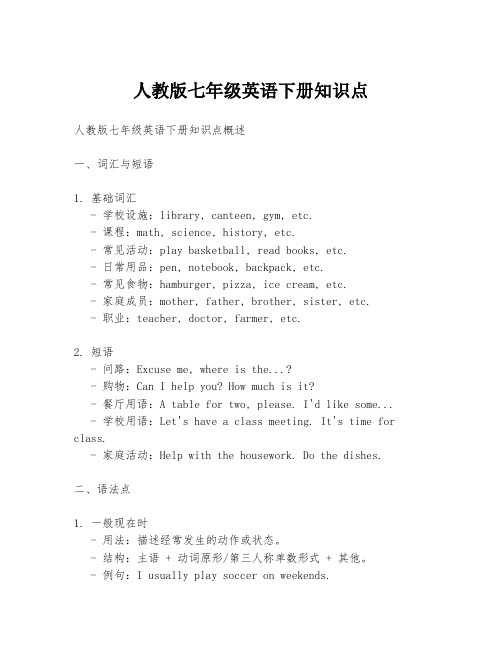
人教版七年级英语下册知识点人教版七年级英语下册知识点概述一、词汇与短语1. 基础词汇- 学校设施:library, canteen, gym, etc.- 课程:math, science, history, etc.- 常见活动:play basketball, read books, etc.- 日常用品:pen, notebook, backpack, etc.- 常见食物:hamburger, pizza, ice cream, etc.- 家庭成员:mother, father, brother, sister, etc.- 职业:teacher, doctor, farmer, etc.2. 短语- 问路:Excuse me, where is the...?- 购物:Can I help you? How much is it?- 餐厅用语:A table for two, please. I'd like some... - 学校用语:Let's have a class meeting. It's time for class.- 家庭活动:Help with the housework. Do the dishes.二、语法点1. 一般现在时- 用法:描述经常发生的动作或状态。
- 结构:主语 + 动词原形/第三人称单数形式 + 其他。
- 例句:I usually play soccer on weekends.2. 一般过去时- 用法:描述过去某一时间发生的动作或状态。
- 结构:主语 + 动词的过去式 + 其他。
- 例句:He visited his grandparents last week.3. 现在进行时- 用法:描述正在进行的动作。
- 结构:主语 + am/is/are + 动词-ing + 其他。
- 例句:She is reading a book now.4. 可数名词与不可数名词- 可数名词:可以用数字计数的名词,如:book, apple。
人教版七年级下册英语重点知识梳理
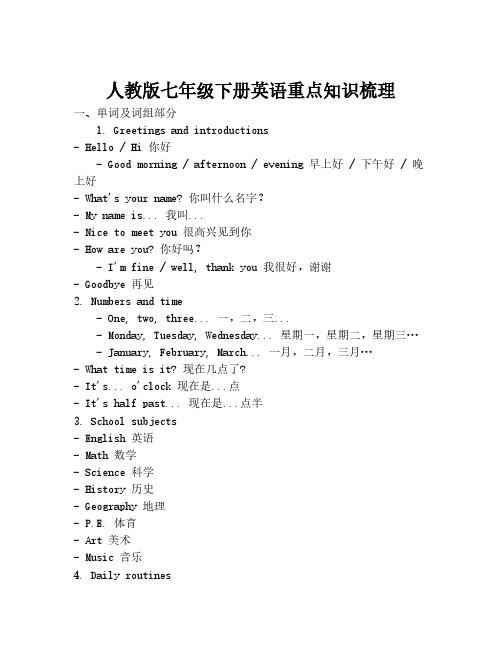
人教版七年级下册英语重点知识梳理一、单词及词组部分1. Greetings and introductions- Hello / Hi 你好- Good morning / afternoon / evening 早上好 / 下午好 / 晚上好- What's your name? 你叫什么名字?- My name is... 我叫...- Nice to meet you 很高兴见到你- How are you? 你好吗?- I'm fine / well, thank you 我很好,谢谢- Goodbye 再见2. Numbers and time- One, two, three... 一,二,三...- Monday, Tuesday, Wednesday... 星期一,星期二,星期三…- January, February, March... 一月,二月,三月…- What time is it? 现在几点了?- It's... o'clock 现在是...点- It's half past... 现在是...点半3. School subjects- English 英语- Math 数学- Science 科学- History 历史- Geography 地理- P.E. 体育- Art 美术- Music 音乐4. Daily routines- Get up 起床- Brush teeth 刷牙- Have breakfast 吃早饭- Go to school 去学校- Have lunch 吃午饭- Do homework 做作业- Go to bed 上床睡觉二、语法部分1. Simple present tense- 主语 + 动词原形(第三人称单数要加-s或-es)- I / You / We / They play soccer.- He / She / It plays soccer.2. Question words- What 什么- When 什么时候- Where 在哪里- Why 为什么- How 怎么样三、对话部分- A: What's your name? 你叫什么名字?- B: My name is Lucy. 我叫露西。
人教版七年级英语下册必背知识点(精编排版)

人教版七年级英语下册必背知识点(精编排版)本文档总结了人教版七年级英语下册的必背知识点,旨在帮助学生有效地复和掌握这些内容。
Unit 1 School Life- Words and expressions related to school subjects- Sentences to describe school subjects and preferences- Vocabulary related to school facilitiesUnit 2 Hobbies- Vocabulary related to hobbies and leisure activities- Simple sentences to discuss hobbies and preferences- Expressions to talk about likes and dislikesUnit 3 Friends- Vocabulary related to friendship and social interactions- Sentences to describe friends' personalities and appearances - Expressions to talk about daily activities with friendsUnit 4 Health- Vocabulary related to health, illnesses, and sports- Sentences to discuss health habits and give advice- Expressions to talk about feelings and emotionsUnit 5 Shopping- Vocabulary related to shopping, clothes, and colors- Sentences to describe and buy clothes- Expressions to talk about preferences and make suggestionsUnit 6 Neighborhood- Vocabulary related to places in the neighborhood- Sentences to give directions and describe locations- Expressions to talk about daily activities in the neighborhood Unit 7 Daily Routine- Vocabulary related to daily routines and activities- Sentences to describe daily routines and schedules- Expressions to talk about time and frequencyUnit 8 Food and Drink- Vocabulary related to food, drink, and table manners- Sentences to describe food preferences and order meals- Expressions to talk about likes and dislikes regarding food Unit 9 Holidays- Vocabulary related to holidays and celebrations- Sentences to talk about past and future events- Expressions to give invitations and make travel plansUnit 10 Weather- Vocabulary related to weather and seasons- Sentences to describe weather conditions and make predictions - Expressions to talk about clothes suitable for different weatherUnit 11 Daily Life- Vocabulary related to daily activities and chores- Sentences to talk about doing household chores and responsibilities- Expressions to give general descriptions of daily lifeUnit 12 Transportation- Vocabulary related to transportation and travel- Sentences to describe modes of transportation and travel plans - Expressions to talk about preferences and give directions以上是人教版七年级英语下册必背知识点的简要概述,希望对学生的学习有所帮助。
2019最新新人教版七年级下册英语知识点
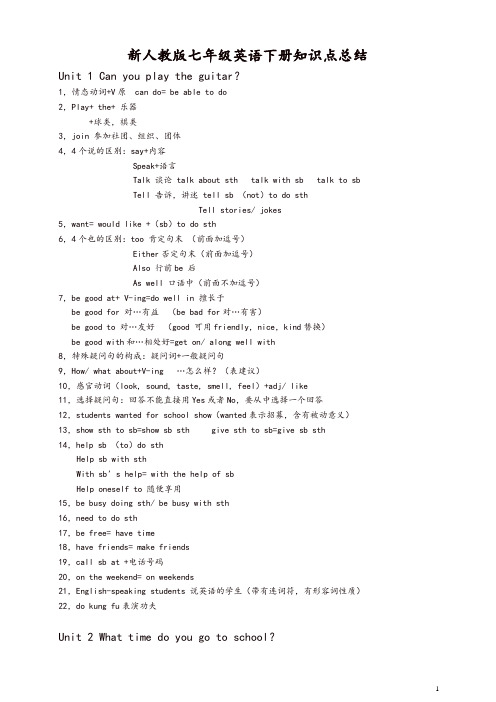
新人教版七年级英语下册知识点总结Unit 1 Can you play the guitar?1,情态动词+V原 can do= be able to do2,P lay+ the+ 乐器+球类,棋类3,j oin 参加社团、组织、团体4,4个说的区别:say+内容Speak+语言Talk 谈论 talk about sth talk with sb talk to sb Tell 告诉,讲述 tell sb (not)to do sthTell stories/ jokes5,w ant= would like +(sb)to do sth6,4个也的区别:too 肯定句末(前面加逗号)Either否定句末(前面加逗号)Also 行前be 后As well 口语中(前面不加逗号)7,b e good at+ V-ing=do well in 擅长于be good for 对…有益(be bad for对…有害)be good to 对…友好(good 可用friendly,nice,kind替换)be good with和…相处好=get on/ along well with8,特殊疑问句的构成:疑问词+一般疑问句9,H ow/ what about+V-ing …怎么样?(表建议)10,感官动词(look, sound, taste, smell, feel)+adj/ like11,选择疑问句:回答不能直接用Yes或者No,要从中选择一个回答12,students wanted for school show(wanted表示招募,含有被动意义)13,show sth to sb=show sb sth give sth to sb=give sb sth14,help sb (to)do sthHelp sb with sthWith sb’s help= with the help of sbHelp oneself to 随便享用15,be busy doing sth/ be busy with sth16,need to do sth17,be free= have time18,have friends= make friends19,call sb at +电话号码20,on the weekend= on weekends21,English-speaking students 说英语的学生(带有连词符,有形容词性质)22,do kung fu表演功夫Unit 2 What time do you go to school?1,问时间用what time或者whenAt+钟点 at 7 o’clock at noon/ at night(during/ in the day)On+ 具体某天、星期、特指的一天 on April 1st on Sunday on a cold winter morningIn +年、月、上午、下午、晚上2,时间读法:顺读法逆读法:分钟≤30用past five past eight(8:05) half past eight(8:30)分钟>30用to a quarter to ten(9:45)整点用…o’clock 7 o’clock(7:00)3,3个穿的区别:wear 表状态,接服装、手套、眼镜、香水等Put on 表动作,接服装Dress 表动作,接sb/ oneself get dressed穿衣3,感叹句:How+adj+主谓!How+adj+a/an +n单+主谓!What+ a/an +adj+ n单+主谓!What+ adj+ n复/ 不可数+主谓!4,f rom…to…5,b e/ arrive late for6,频度副词(行前be 后)Always usually often sometimes seldom hardly never7,一段时间前面要用介词for for half an hour for five minutes8,e at/ have… for breakfast/ lunch/ dinner/ supper9,e ither…or10,a lot of=lots of11,it is +adj+for sb +to do sth (adj修饰to do sth)It is important for me to learn English.it is +adj+of sb +to do sth (adj修饰sb) It is kind/ friendly/ nice of you to help me.Unit 3 How do you get to school?1,疑问词How 如何(方式)how long 多长(时间)答语常用“(For/ about +)时间段”how far多远(距离)答语常用“(It’s +)数词 +miles/ meters/ kilometers”how often多久一次(频率)答语常用“Always/ often/ every day/…”或“次数+时间”等表频率的状语How soon多快,多久以后,常用在将来时中。
七年级下册英语知识点总结人教版
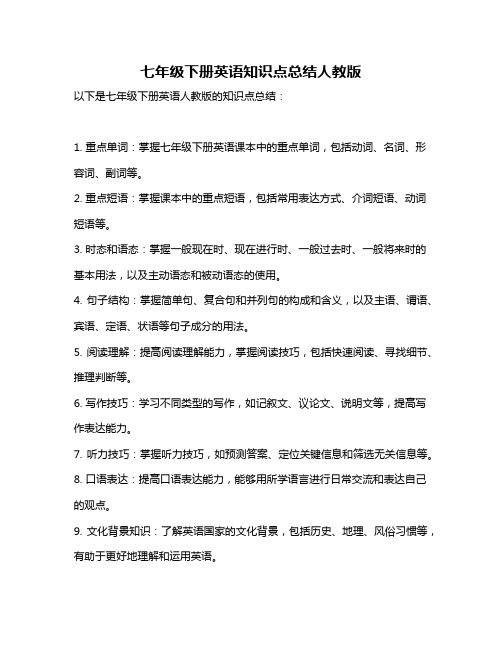
七年级下册英语知识点总结人教版
以下是七年级下册英语人教版的知识点总结:
1. 重点单词:掌握七年级下册英语课本中的重点单词,包括动词、名词、形容词、副词等。
2. 重点短语:掌握课本中的重点短语,包括常用表达方式、介词短语、动词短语等。
3. 时态和语态:掌握一般现在时、现在进行时、一般过去时、一般将来时的基本用法,以及主动语态和被动语态的使用。
4. 句子结构:掌握简单句、复合句和并列句的构成和含义,以及主语、谓语、宾语、定语、状语等句子成分的用法。
5. 阅读理解:提高阅读理解能力,掌握阅读技巧,包括快速阅读、寻找细节、推理判断等。
6. 写作技巧:学习不同类型的写作,如记叙文、议论文、说明文等,提高写作表达能力。
7. 听力技巧:掌握听力技巧,如预测答案、定位关键信息和筛选无关信息等。
8. 口语表达:提高口语表达能力,能够用所学语言进行日常交流和表达自己的观点。
9. 文化背景知识:了解英语国家的文化背景,包括历史、地理、风俗习惯等,有助于更好地理解和运用英语。
10. 词汇记忆:掌握有效的词汇记忆方法,如分类记忆、联想记忆、重复记忆等,能够快速扩大词汇量。
以上是七年级下册英语人教版的知识点总结,希望对您有所帮助。
2019最新人教版七年级下册英语知识点归纳

人教版七年级下册英语知识点归纳Unit 1 Can you play the guitar ?1. play the +乐器(guitar ,piano, drums, violin ,)2. 俱乐部名称:art club ,艺术俱乐部,English club 英语俱乐部,swimming club 游泳俱乐部, music club 音乐俱乐部, chess club ,象棋俱乐部3. play +体育(basketball,……)4. want to do sth 想要做某事例如:He wants to join the chess club.5. She can sing and dance .(否定形式)She can’t sing or dance .6. 1).be good at 擅长于…= do well in 例如:Tom is good at playing thedrums .=Tom does well in playing(注意:介词后加动名词) the drums .2).be good for 对…有好处例如:Swimming (动名词作主语) is good for us .Eating vegetables is (注意:动名词作主语谓语动词用单数)3)be good with=get on well with 善于应付……的,与…相处得好例如: The man is good with children4). Be good to 对…好例如: My English teacher is good to me .7. the story telling club 讲故事俱乐部8 .what about=how about …..怎么样?表示提建议。
例如:(1) . What about you ?(2) .What about playing chess ?(用来提建议)9. sports club 运动俱乐部10. school show 学校演出拓展:show sb sth= show sth to sb例:show me your photo=show your photo to me11. do Chinese kungfu 打中国拳12. old people’s home 敬老院13. make friends 交朋友14 . need to do sth 需要做某事例如:We need to have seven classes a day .拓展:need sb to do sth 需要某人做某事例如:We need you to play the violin .15. play games 做游戏16. have time to do sth 有时间做某事例如:On Saturdays we have time to watch TV.have no time to do sth 没有时间做某事例如:We have no time to play games on weekdays .17. help (sb) with sth 在某方面帮助某人例如: My English teacher often helps us with our English.help sb do sth,,help sb to do sth 帮助某人做某事例如:I help Tom learn Chinese and he helps me to learn English.18. teach sb sth 教某人某事例如: Miss Smith teaches us(注意:此处一定不能用our等物主代词) English.teach sb to do sth 教某人做某事例如: Our music teacher always teaches us to sing songs .19. on(或at) the weekend 在周末20 .be free = have time 空闲的例如:I am free today. = I have time today .21 . be busy with 忙于做某事例:I am busy with my homework on weekdays .be busy doing sth 忙于做某事例:We are always busy reading English every morning .22. sports center 运动中心23. after school 放学后24. after class 下课后25. after work 下班后26 . an English—speaking student 一名说英语的学生27. be in the school music festival 参加学校音乐节本单元易错单词:guitar ,piano ,musician, violin ,center ,情态动词can 句式变换: Jane can play the piano .(1) 否定句形式直接在can后加not Jane can’t play the piano .(2) 一般疑问句及回答,将can 提到句首 Can Jane play the piano ?Yes ,she can ./No ,she can’t.(3) 对划线部分提问用what 对动词或动词短语提问,用do代替原来的动词原形 What can Jane do ?本单元常用句型:.What club do you want to join ?( I want to join the swimming club)注意区分:speak,say,talk和1.say,着重说话的内容。
2019年人教版初一下册英语知识归纳word版本 (4页)
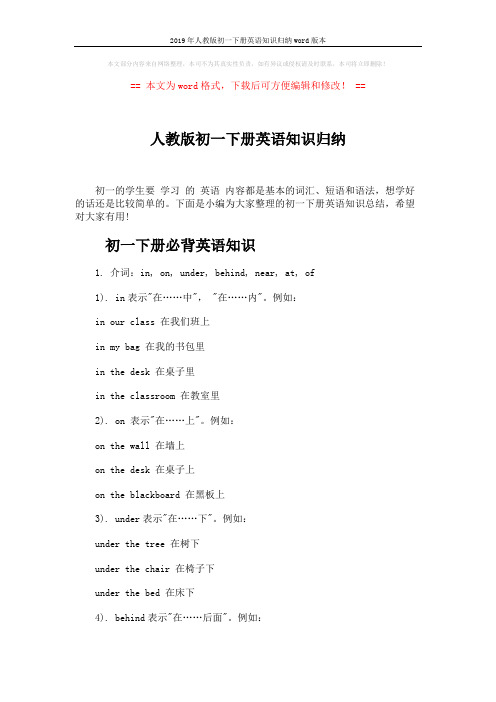
本文部分内容来自网络整理,本司不为其真实性负责,如有异议或侵权请及时联系,本司将立即删除!== 本文为word格式,下载后可方便编辑和修改! ==人教版初一下册英语知识归纳初一的学生要学习的英语内容都是基本的词汇、短语和语法,想学好的话还是比较简单的。
下面是小编为大家整理的初一下册英语知识总结,希望对大家有用!初一下册必背英语知识1. 介词:in, on, under, behind, near, at, of1). in表示"在……中", "在……内"。
例如:in our class 在我们班上in my bag 在我的书包里in the desk 在桌子里in the classroom 在教室里2). on 表示"在……上"。
例如:on the wall 在墙上on the desk 在桌子上on the blackboard 在黑板上3). under表示"在……下"。
例如:under the tree 在树下under the chair 在椅子下under the bed 在床下4). behind表示"在……后面"。
例如:behind the door 在门后behind the tree 在树后5). near表示"在……附近"。
例如:near the teacher's desk 在讲桌附近near the bed 在床附近6). at表示"在……处"。
例如:at school 在学校at home 在家at the door 在门口7). of 表示"……的"。
例如:a picture of our classroom 我们教室的一幅画a map of China 一张中国地图初一下册英语知识要点冠词 a / an / the:冠词一般位于所限定的名词前,用来署名名词所指的人或事物。
- 1、下载文档前请自行甄别文档内容的完整性,平台不提供额外的编辑、内容补充、找答案等附加服务。
- 2、"仅部分预览"的文档,不可在线预览部分如存在完整性等问题,可反馈申请退款(可完整预览的文档不适用该条件!)。
- 3、如文档侵犯您的权益,请联系客服反馈,我们会尽快为您处理(人工客服工作时间:9:00-18:30)。
新人教版2019初一下册英语知识点Unit 1 Can you play the guitar ?1、can+动词原形,它不随主语和数而变化。
(1)含有can的肯定句:主语+can+谓语动词的原形+其他。
(2)变一般疑问句时,把can提前:Can+主语+动词原形+其他?肯定回答:Yes,主语+can。
否定回答:No,主语+can't.(3)含有can的否定句:主语+can't+动词的原形+其他。
(4)含有can的特殊疑问句:特殊疑问词+can+主语+动词原形+其他?2、may+动词的原形。
(may为情态动词)一般疑问句是把may提前,肯定回答是:Yes,主语 +may。
否定回答是:No,主语+mustn't。
或please don't。
join+某个组织,俱乐部,party,参军,党派等“加入”Join sb. “参加到某人中” join in (doing)sth “加入做......,参加某个活动” Join in=take part in +活动,比赛3、说某种语言:speak+语言4、play+球、棋、牌;play+the+乐器。
5、擅长于(做)什么:be good at +名词/动ing6、协助某人做某事:help sb. (to ) do sth. help sb. with sth.7、我能知道你名字吗?May I know your name?8、想要做什么:want to do sth 例如:I want to learn about art.9、What club do you want to join?I want to join the chess club and the basketball club.10、What club does Tom want to join? He wants to join the swimming club .11、He can’t play the violin or the piano. Can you help kids with swimming?12、Why do you want to join the English club? Because I want to learn English well.Unit 2 What time do you go to school ?1、what time和when引导的特殊疑问句。
(1)对时间提问用what time,也能够用when。
询问钟点时用what time,询问日期、月份、年份时用when。
(2)询问做某事的时间时,两者能够互换。
(3)其他询问时间的句子:What's the time? =What time is it?现在几点了?时刻表达法:顺读法和逆读法。
(1)顺读法:“钟点+分钟”直接读数字。
(2)逆读法:借助介词past或to表示,要先说分再说钟点。
A.当分钟不超过30分钟时(包括30分钟),即30,用to表示。
其结构为:“所差分钟(即60—所过度钟数)+to+下一个整点”,to译成“差”,差几分钟到几点。
C.当分钟为30分钟用half表示,当分钟为15分钟用a quarter。
2、always 总是>usually 通常>often常常>sometime 有时3、Watch+TV、球赛“观看,观赏”,特指长时间注视。
See+电影、医生“看见”,强调看的结果。
Look “看”,强调看的动作,look后接宾语时要用介词at。
Read+书刊、杂志“阅读”4、listen to +宾语 6、Take a shower “淋浴” 7、Eat breakfast 吃早餐5、Go to +地点名词如:go to school go+地点副词如:go homeUnit 3 How do you get to school?一、本单元知识点总结1.get to school 到校2.take the subway 乘地铁3.take the train 坐火车4.leave for 到……地方去,离开去某地5.take…to…把……带到……6. most students 绝大部分学生7. from…to…从……到…… 8.think of 想到,想起9.ride bikes 骑自行车 10.in other parts of the world 在世界的其他地方11. how far 多远 (路程、距离) 12.how long多长(时间)13.take the train to school 乘火车去上学 14.in places 在一些地方15.go to school by boat乘船去上学 16.on the school bus乘坐校车17.be different from和……不同 18.one 11-year old boy 一个十一岁大的男孩二、重点知识详解1.take +a/an/the+表示交通工具的名词,乘……去某地,是动词短语,在句中作谓语。
He takes the train. take the subway乘地铁 take a walk散步take a shower洗个澡take a rest休息一会 take a seat 坐下 take some medicine 吃药2.by+表示交通工具的单数名词或on/in+ a/an/the/one’s+表示交通工具的单数名词,是介词短语作方式状语。
I get to school by bike. = I get to school on my bike.3.walk/ride/drive/fly+to+地点名词,步行/骑自行车/开车/坐飞机去某地表示乘交通工具方式能够互换表达相同的意义:Take the bus to school=go to school by bus=go to school on a busDrive a car to work=go to work by car=go to work in a carFly to shanghai=go to shanghai by plane/air=take the/a plane to shanghai=go to shanghai on a/an/the plane.4.get表示“到达”,后接名词需加to,接地点副词不加to.reach 给示到达,是及物动词,其后直接接宾语。
arrive in+大地点 arrive at +小地点后接副词不需介词。
5. It takes sb some money/time to do sth.花费某人多少时间/钱做某事Sb pay some money for sth 某人为某物花费多少钱Sb spend some time/money on sth 某人在做某事或某物上花费时间/钱Sb spend some time/ money (in)doing sth Sth cost sb some money 某物花费某人多少钱6. How far is it from A to B?=How far is B from A?答语有两种:(1)It’s…meters/miles/kilometers(away)有……米/英里/千米(远)(2)It ‘s about ten minutes’ walk/ ride. 大约有十分钟步行/骑车的路程。
7have to 后加动词原形,侧重客观的需要,有“不得不,被迫”之意,有多种时态形式,否定式为don’t have to(needn’t)意为“不必”。
Must 侧重于说话者的主观看法,认为有必要或有义务做某事,只有现在时一种形式,否定式must’t意为“一定不要,不允许,禁止”反意词为“needn’t”。
8.感谢用语:Thank you very much , Thanks a lot , Many thanks.回答感谢用语的句子:That’s ok /all right. 不用谢。
You are welcome 不客气。
It is my pleasure./My pleasure./It is a pleasure.不客气、那是我的荣幸。
/Don’t mention it。
别在意。
It was nothing at all.那没什么。
三、语法归纳(一)how 引导的特殊疑问句1.how 引导的特殊疑问句提问交通方式,其答语分三种情况:a. take a/an/the+交通工具(单数)b. by+交通工具(单数)c. on/in+限定词+交通工具2. how far 用来提问距离,多远,其答语分为两种:(1)用长度单位表示:It is five kilometers.(2)用时间表示:It’s twenty minutes’ walk.3.how long 用来提问时间,意为多久回答常用“for+段时”。
----How long have you learnt English?----For 3 years.how soon 用来提问做完某事还需要多长时间,常用于将来时态时,常用“in+时间段”来回答。
――How soon will you arrive in Beijing?----In 3 hours.Unit 4 Don’t eat in class肯定的祈使句:(1) 实义动词原形+其他; (2) be动词原形+形容词+其他; (3) Let sb do sth.否定的祈使句:(1) Don’t+实义动词+原形;(2) Don’t be+形容词+其他;(3) Don’t let sb do sth (4) No+Ving.练:(1) My mother said to me, “Tom, _______ in bed.”A. not readB. doesn’t readC. don’t readD. didn’t read(2) Don’t __________ (fight). = No __________ (fight).2. 不要迟到:Don’t arrive late. = Don’t be late. (arrive = be)上课/上学不要迟到:Don’t arrive (be) late for class/school.3. 主语省略(无主语):Don’t arrive late for class.主语不省略(有主语):We can’t arrive ;ate for class.4. 在学校我们必须穿校服:We have to wear uniforms at school.句型:不得不/必须做某事:have to do sth否定:不必做某事:don’t have to do sth穿校服:单数:wear a uniform 复数:wear uniforms练:(1) –I can’t stop smoking, doctor. – For your health, I’m afraid you ______.A. canB. mayC. mustD. have to5. 在我家里有太多的规矩:I have too many rules in my house.词组:太多…:too many…6. 我从来没有任何快乐:I never have any fun.(never译为“从来没有”,表示否定,否定句中表示“任何,一些”,用any)7. 不要大声说话:Don’t talk loudly.请大声说:Speak loudly, please.8. 他擅长于唱歌:He is good at singing.句型:擅长于做某事:be good at doing sth9. 表示“地点”的词组:(1) 在教室里:in the classroom 在课堂上:in class(2) 在走廊上:in the hallways 在学校里:at school = in school10. 表示“时间”的词组:(1) 下课后:after class 放学后:after school(2) 在上学的白天/晚上:on school days/nights 比较:at night(3) 到晚上10点钟之前:by 10 o’clock p.m.11. (1) with 和;如:He lives in Beijing with my parents. (不能用and)(2) with 戴着;如:Do you know the fat man with a hat? (不能用wears)(3) with 有着;如:It’s an old house with a beautiful garden. (不能用has)Unit5 Why do you like pandas?1. –让我们先去看考拉。
